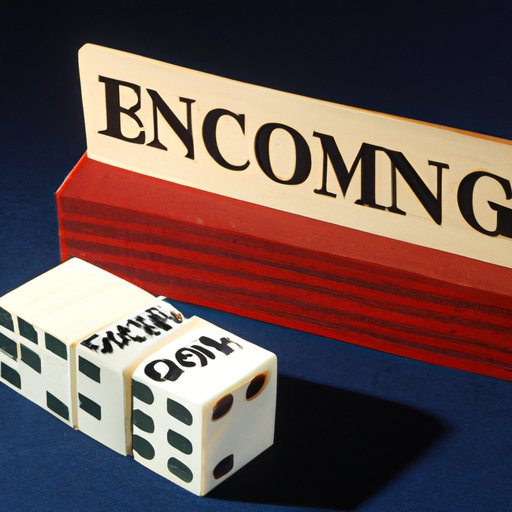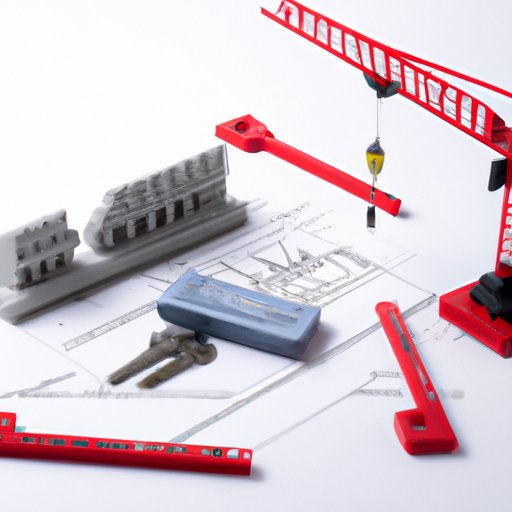I. Introduction
Building a casino is a complex and challenging undertaking that requires careful planning and execution. From determining the location to obtaining the necessary permits, designing the layout, obtaining equipment, and navigating legal requirements, there are many steps involved in creating a successful casino enterprise. In this article, we will explore the step-by-step process of building a casino, including the economics of the project, legal considerations, and the design and construction process. We will also examine the impact that a casino can have on its surrounding community, including economic benefits and potential negative effects. Finally, we will discuss the challenges and obstacles that can arise during the construction process, as well as strategies for overcoming them.
II. Step-by-step guide to building a casino
A. Determining the location
The first step in building a casino is to determine the location. Factors to consider include the size of the property, its proximity to major highways, airports, and public transportation, as well as local zoning ordinances and regulations. It is also essential to consider the local competition and the demographics of the surrounding area.
1. Factors to consider
When choosing a location for your casino, there are several factors to consider. The most important is the size of the property, as this will determine the capacity of your casino. It is also important to consider the surrounding community and their views on the casino, as well as the local competition and demographics.
2. Choosing the right location
Once you have determined the key factors to consider, you can begin researching potential locations that meet your criteria. Browse real estate listings, visit potential properties, and gather information on the surrounding community, including crime rates and potential concerns or opposition to a casino in the area.
B. Acquiring permits
Once you have chosen your location, the next step is to obtain the necessary permits. This can be a complicated and time-consuming process, as there are many legal requirements and licensing procedures to navigate. It is important to consult with a legal professional or consultant who is familiar with the local laws and regulations in your area.
1. Legal requirements
There are many legal requirements to consider when building a casino, including zoning and land use regulations, environmental impact assessments, and building codes. It is essential to comply with all relevant laws and regulations to avoid delays, fines, or legal action.
2. Licensing procedures
In addition to legal requirements, there are licensing procedures to follow when building a casino, including obtaining a gambling license and other necessary permits. This can be a complex process that requires a thorough understanding of the local laws and regulations.
C. Designing the layout
The layout of your casino is one of the most important factors to consider, as it can greatly impact the customer experience. It is essential to design a layout that is intuitive and easy to navigate, with clear signage and a logical flow. This can help ensure that customers have a positive experience and will be more likely to return.
1. Importance of a good casino layout
A well-designed casino layout can make all the difference in attracting and retaining customers. The layout should be easy to navigate, with clear signage and a logical flow that allows customers to move easily between different areas of the casino.
2. Factors to consider
When designing the layout of your casino, it is important to consider factors such as traffic flow, lighting, and the placement of gaming equipment. You should also consider the customer experience, and ensure that there are plenty of amenities and services available, such as restaurants, bars, and entertainment.
D. Obtaining equipment
Once you have designed your layout, the next step is to obtain the necessary equipment. This can include everything from gaming tables and slot machines to security cameras and software. It is important to choose high-quality equipment that is reliable and durable, as this will help ensure that your casino runs smoothly and efficiently.
1. Essential equipment
The essential equipment for a casino includes gaming tables, slot machines, security cameras, and software. You will also need to purchase furniture and other amenities for your customers, such as restaurants, bars, and entertainment venues.
2. Additional equipment options
There are many additional equipment options to consider when building a casino, including high-tech security systems, virtual reality gaming options, and advanced analytics software. It is important to choose equipment that is in line with your budget and business goals.

III. Economics of building a casino
A. Costs involved in building a casino
Building a casino can be a costly undertaking, with many expenses to consider. These can include land acquisition costs, construction costs, licensing and permit fees, and other expenses such as marketing and staffing.
1. Land acquisition costs
The cost of acquiring land for your casino can vary greatly depending on the location, size, and surrounding area. It is essential to budget for this expense, as it can be a significant portion of your overall costs.
2. Construction costs
The cost of construction can also vary greatly depending on the size and complexity of your casino. It is important to work with experienced architects and contractors to ensure that your project stays on budget and is completed on time.
3. Licensing and permit fees
The fees for obtaining the necessary licenses and permits can also be a significant expense during the construction process. It is important to budget for these fees and to work with a legal professional who can help guide you through the application process.
4. Other expenses
Other expenses to consider when building a casino include staffing costs, marketing expenses, and ongoing maintenance and repairs. It is important to create a comprehensive budget that includes all of these expenses in order to ensure the long-term success of your casino.
B. Potential risks and rewards
Building a casino can be a risky investment, but it also has the potential for high rewards. It is important to carefully consider the potential risks and rewards before embarking on such a project.
1. Revenue sources
The primary revenue source for a casino is gambling, but there are many other potential sources of revenue to consider, such as food and beverage sales, entertainment, and retail sales.
2. Profit margins
The profit margins for a casino can vary greatly depending on a variety of factors, including location, competition, and customer demand. It is important to work with an experienced financial professional who can help you create realistic financial projections.
3. Return on investment
The return on investment for a casino can be significant, but it is important to carefully consider the risks and rewards before making such a large investment. Working with an experienced financial professional can help you make informed decisions about your investment.
C. Financing options available
There are several financing options available to those interested in building a casino, including bank financing, private equity financing, and crowdfunding.
1. Bank financing
Bank financing can be a viable option for those with good credit and a solid business plan. It is important to shop around and compare rates and terms in order to find the best financing option for your needs.
2. Private equity financing
Private equity financing can be a good option for those who are willing to give up a portion of their ownership in exchange for funding. It is important to work with experienced investors who can provide guidance and support throughout the construction process.
3. Crowdfunding
Crowdfunding can be a creative way to raise funds for your casino, but it requires a strong marketing strategy and a compelling pitch. It is important to carefully consider the risks and rewards before embarking on a crowdfunding campaign.

IV. Legal considerations in opening a casino
A. State and federal laws
There are many state and federal laws to consider when opening a casino, including gambling laws, labor laws, and taxation laws. It is important to work with a legal professional who is knowledgeable about these laws and can help you navigate the legal requirements.
1. Gambling laws
There are many gambling laws that must be complied with when opening a casino, including laws related to the types of games that can be offered, the minimum age for gambling, and the regulation of gambling activities.
2. Labor laws
There are also many labor laws to consider when opening a casino, including laws related to minimum wage, overtime, and workplace safety. It is important to comply with all relevant labor laws in order to maintain a safe and healthy workplace for your employees.
3. Taxation laws
There are also many taxation laws to consider when opening a casino, including state and federal income taxes, sales and use taxes, and property taxes. It is important to work with a financial professional who can help you navigate these complex tax laws.
B. Licensing requirements
In addition to complying with state and federal laws, there are also licensing requirements to consider when opening a casino. These can include submitting an application for a gambling license, paying fees and charges, and meeting other regulatory requirements.
1. Application process
The application process for a gambling license can be complex and time-consuming, and it is important to work with a legal professional who can help you navigate this process. You will need to provide detailed information about your business model, financial projections, and other relevant information.
2. Fees and charges
There are also fees and charges associated with obtaining a gambling license, including application fees, renewal fees, and other regulatory charges. It is important to budget for these expenses in your overall budget.
C. Regulations in place to ensure fairness and safety
There are many regulations in place to ensure the fairness and safety of casino operations, including security measures, anti-money laundering regulations, and responsible gambling measures.
1. Security measures
It is essential to have strong security measures in place to prevent theft, fraud, and other criminal activity. This can include surveillance cameras, security guards, and other measures.
2. Anti-money laundering regulations
There are strict anti-money laundering regulations in place to prevent casinos from being used for money laundering or terrorist financing. It is important to be aware of these regulations and to comply with all relevant laws and regulations.
3. Responsible gambling measures
It is also important to have responsible gambling measures in place to ensure that customers are not becoming addicted to gambling. This can include providing resources and information about problem gambling, as well as imposing betting limits and other restrictions.
V. Design and construction of a casino
A. Planning and execution of a casino build
The planning and execution of a casino build can be a complex process that requires careful planning and attention to detail. It is important to work with experienced architects, design teams, and project managers who can help guide you through the process.
B. Interview with architects, design teams, and project managers
An interview with architects, design teams, and project managers can provide valuable insights into the design and construction process. It is important to ask questions about their experience, their approach to the project, and their portfolio of previous work.
C. Behind-the-scenes look at the construction process
A behind-the-scenes look at the construction process can provide a valuable perspective on the process. This can include information on timelines and deadlines, budgeting and resource allocation, and the challenges and obstacles that can arise during the construction process.
